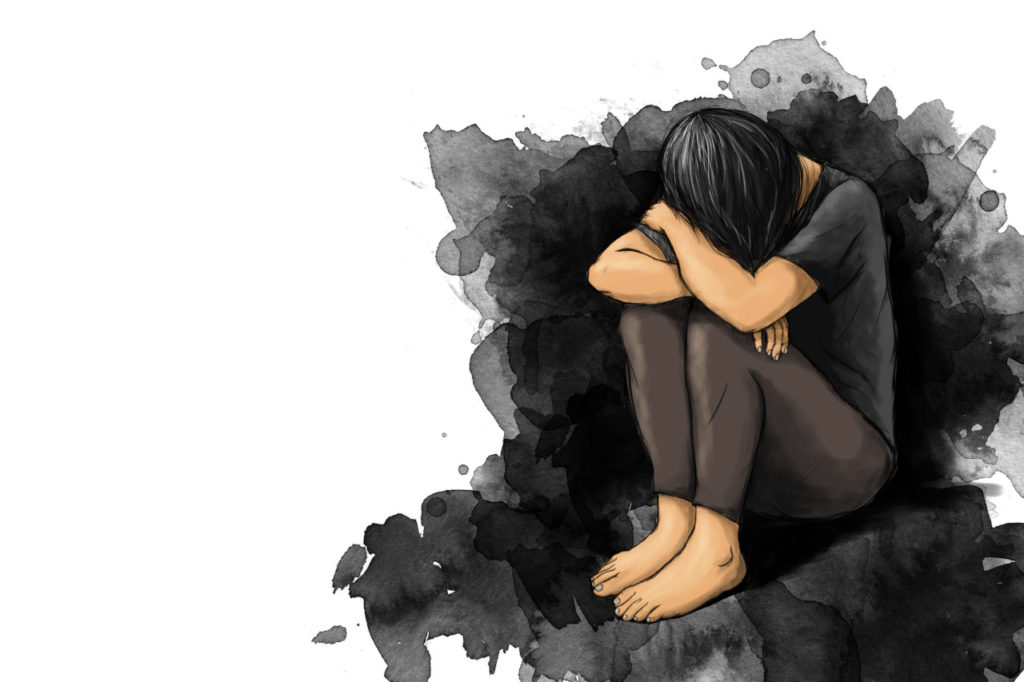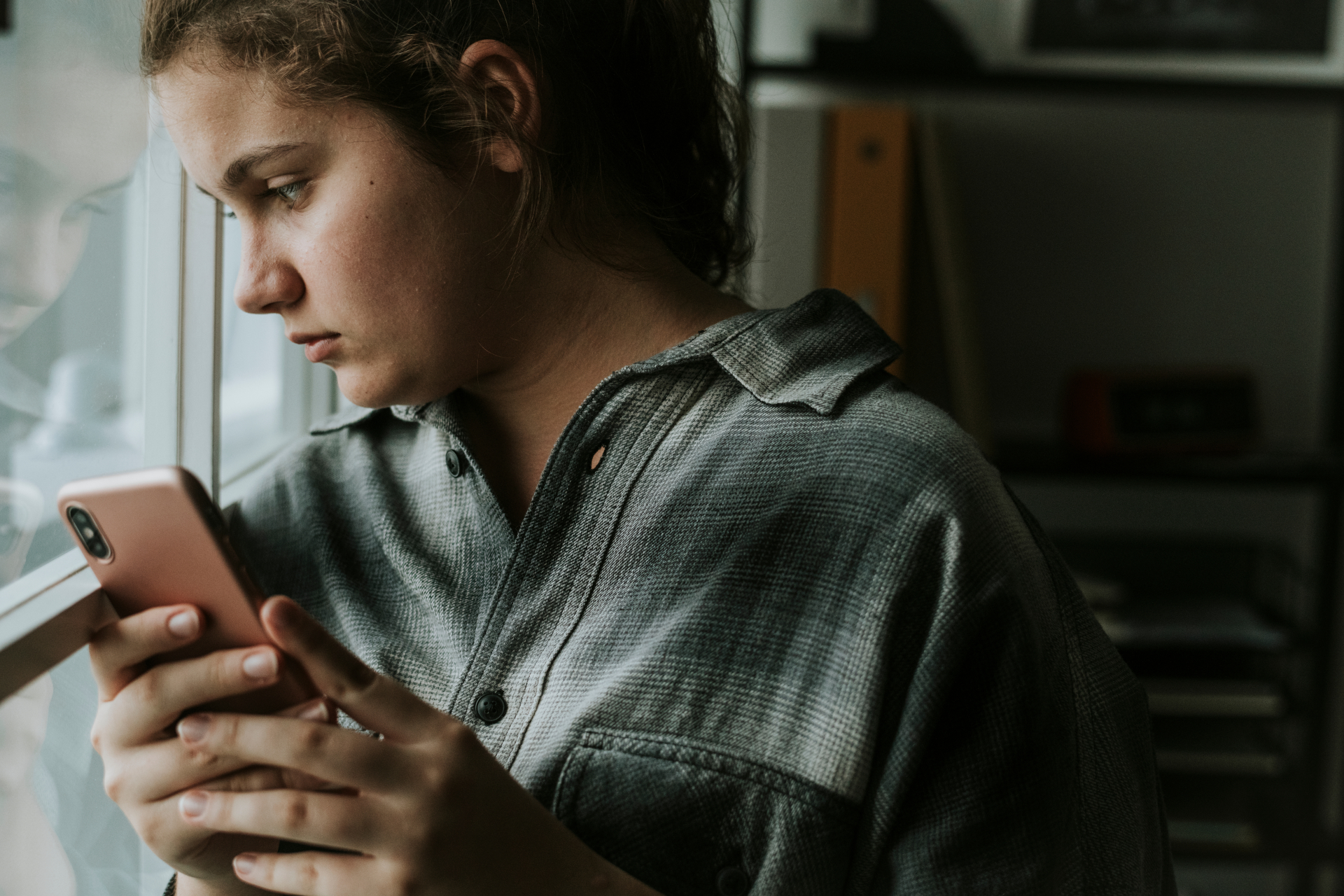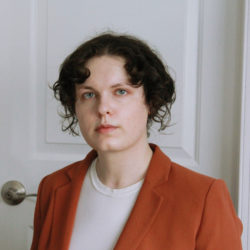I happened to discover Dabrowski’s theory of positive disintegration (TPD) while I was in a period of deep depression during my gender transition. I had been on testosterone for about a year and was having serious doubts about transitioning, questioning the ideas being passed around in the trans community and even the purpose and meaning of gender itself.
I read everything I could find about TPD. What I read eerily mirrored my experiences and caused me to begin to reconsider my decision to transition.
Gifted, Lesbian, Online—and Lost
I had been identified as gifted in school and had always been something of a social outcast—an odd duck for reasons I couldn’t figure out. Despite my parents’ and teachers’ belief in my potential, by the time I got to middle school, I was struggling. My learning differences were obvious, and my teachers had no idea what to do with my erratic performance. By high school, I had deemed myself stupid and an academic failure. Having almost daily panic attacks, I dropped out of my dream college after three arduous and mentally taxing (though academically successful) semesters. It took everything out of me, and I felt exhausted, lost, and completely demoralized.
During this time, I was also struggling with my sexual orientation and identity. I discovered my same-sex attraction at age seventeen and, living in a small town with no real-life gay community to be found, I quickly got involved in online LGBT communities. There I discovered the concept of a nonbinary gender identity. This resonated with me, as I had never identified with the cultural idea of womanhood, but at that point I wasn’t seriously considering transitioning medically.
Despite belonging to these online spaces, I felt I had no one to whom I could speak candidly about my struggles: online discussions were heavily socially policed and I had learned to self-censor to avoid potential conflict and estrangement.
Overall, however, I still felt troubled by my gender and sexuality through my teen years and into my young adulthood. Despite belonging to these online spaces, I felt I had no one to whom I could speak candidly about my struggles: online discussions were heavily socially policed, and I had learned to self-censor to avoid potential conflict and estrangement from the community.
My Path to Transition
Several months before the pandemic began, I was actively identifying as transmasculine (a sort of catch-all term for a female person who has socially or medically transitioned to a more masculine presentation, but does not necessarily identify as a man—I couldn’t commit to calling myself a “trans man” yet), and I slowly came out to my social circle. I was heavily online, had few friends in real life, and was emotionally and physically distanced from my family, too. I suffered from debilitating anxiety and was extraordinarily depressed. I was desperate for a way out of the loneliness, alienation, and stagnation that I felt in every waking moment. I was miserably bored at my job. I didn’t fit in with my older, gender-conforming coworkers. I hated my body; I felt like I was a “failed woman”; I felt out of place everywhere I went. I was longing for community, and I was charmed by the “chosen family” narrative offered up by the trans community.
The more I read about medical transition, the better it sounded—and the more I felt like it was something I absolutely needed to do. By all accounts, my experience matched up perfectly with the “transgender experience.” My therapist supported me. I was anxious to start hormones, and since I was over eighteen, all I needed to do was schedule a doctor’s appointment and tell them I was trans. I had a prescription for testosterone within months. The idea of living as a man and escaping from the choke-hold of culturally-enforced femininity seemed like a godsend—a way out of the psychological hell I was in.

Transition seemed too good to be true, though I desperately wanted it to be true for me. My greatest fear was of regret and detransition. I was reassured online that regret is extremely rare—that it almost never happens. So I tried to put the doubts out of my mind. I wanted to believe that transition would heal me.
Rethinking the Narrative
But a year in, it hadn’t. In fact, I was feeling more and more like transition wasn’t all it was cracked up to be. I realized I was more depressed than ever.
That was when I started researching TPD. In this process, I ran across Third Factor’s article, “Where Intensity and Gender Dysphoria Meet,” where Jessie Mannisto discussed giftedness with both transgender men and detransitioned women. When I read the accounts from the detransitioned women, my blood ran cold. I related exactly to what they were saying.
I didn’t know that being gifted was something that you cannot grow out of—that it is more than simply “getting good grades.” Rediscovering my giftedness (I don’t love the term, but what else is there?) was a paradigm shift; I was looking at myself in an entirely new light, reassessing everything I thought I knew about myself. The doubts I had been having about my transition were suddenly overwhelming; unable to ignore them any longer, I pored through old journals and diary entries and began to put the pieces together. As I had learned from my reading about TPD, gifted children don’t always have it as easy as some might think. But what exactly led me to transition? What effect had being a gifted girl had on my life?
The Physical and Mental Weight of Female Puberty
I started puberty when I was eight years old. My body was rapidly gaining inches around my chest and hips, and though I couldn’t articulate it, I felt as if I was being betrayed by my own anatomy—forced into becoming a sexual object before I could even comprehend what that meant. Whether I wanted it to or not, the mere shape of the fat hanging off of my adolescent frame was advertising my impending sexual maturity. The year before, I had been a child; but almost overnight I started to feel like a child wearing a Halloween costume that I couldn’t take off. It seemed my body, in its natural state, was beginning to send unintended and unwelcome messages out to the world; it drew unwanted looks and comments from males—from family members to complete strangers.
I felt as if I was being betrayed by my own anatomy—forced into becoming a sexual object before I could even comprehend what that meant.
As the years went on, the expectations piled up. I was expected to take a razor to my legs and underarms. I was expected to wake up early and take an hour every morning to paint designs on my face and run a scorching hot iron through my hair. I was expected to pay close attention to my clothes, wear shoes that made my feet hurt after an hour of walking, and stay fashionably on-trend. I was expected to date boys and to try to look good for them.

I didn’t want to do any of these things. Boys didn’t have to do these things; they could just be themselves. Why did I have to put in so much extra work just to exist? Why was it that only girls were expected to do these things?
The Shame of Being a Woman Who’s “Too Much”
As we come of age, female children face ever-growing pressure to conform to patriarchal standards of beauty and behavior, and we learn that it is safer to abandon our authentic natures than to risk social rejection. Every girl faces this struggle, but some girls in particular may have a harder time; either they do not wish to conform, or they could not conform even if they tried. I suppose I was part of both groups. I was a strong-willed child with a rebellious streak and didn’t ever want to do what I was told, but I also didn’t really have a clue how to “be like the other girls” anyway. It seemed no matter how hard I tried, I missed the mark. I was always too much of something. Too loud, too opinionated, too sensitive, too angry, too smart for my own good. When I tried to ratchet it back, I was too withdrawn, too quiet, too timid, too insecure. I just couldn’t win.
I was always too much of something. Too loud, too opinionated, too sensitive, too angry, too smart for my own good. When I tried to ratchet it back, I was too withdrawn, too quiet, too timid, too insecure. I just couldn’t win.
When you are constantly being reminded that you are too much, you begin to collect quite a lot of shame. It is all too easy for young girls to misattribute the source of this shame and to blame themselves for it. Precisely because they are so insidious and pervasive, misogyny and sexism can be incredibly hard to spot if you don’t know what you’re looking for. If you are not educated about feminism and the history of women’s pain—beyond the typical American curriculum which barely brushes over women’s suffrage—you may have no idea that women have been studying, researching, discussing, and writing about this for decades. When girls are not educated about feminism—and when we are not talking to older women about feeling and dealing with the pain of living with these unrealistic expectations—we can start to get the idea that it is our fault.
In my case, I came to the conclusion that since I did not wish to conform to misogynistic ideals and could not conform, then I must not really be a woman.
Seeking Solace and Solidarity Online
Everywhere I looked within the trans and queer communities online, other girls were coming to the same conclusion. There were throngs of female people from their young teens to their twenties and even older expressing similar uneasiness and aggravation with our female bodies; all the things that marked us as different; and all the ways our natural, unaltered selves were somehow wrong. It seemed as if we all collectively blamed ourselves for feeling this way. It’s the same on forums all over the Web:
I dislike having my period and feel disgusted by my large chest. I’m so confused, does that mean I am trans?
I feel more comfortable dressing masculine and I don’t want to have kids. Could I be nonbinary?
Seeing my wide hips in the mirror makes me want to throw up and I hate the sound of my high-pitched voice. Am I trans?
I remember making posts like these, practically begging for permission to deviate from the cultural script that is given to every woman. We felt uncomfortable with the attention that was paid to our breasts and hips and sex organs, irritated that our higher-pitched voices were belittled and spoken over. Whatever society’s idea of womanhood seemed to be, I didn’t like it, and I didn’t want to be it. Accepting that I was becoming a woman felt like admitting inevitable defeat. Transitioning away from womanhood seemed like a way out of a no-win situation, a no-brainer, and plenty of people agreed with me. Online, we encouraged each other to lean into disidentifying with our bodies and our material realities. I was so alienated from my body that I felt like it was no longer mine; its femaleness became to me a symbol of all the ways I was failing to fulfill my apparent societal duty to be a Perfect Woman. And if I could not be a Perfect Woman, I wondered, then, if I was any good at all. I felt utterly worthless.
I practically grew up online in these isolated communities of other lost and angry teenage girls desperately searching for solutions to our collective pain. Spending your formative years in these communities can wildly warp your perception of reality. I was so lonely.

What I Wish I Had Known
What I didn’t know was that there are innumerable women who felt just the way I did—and survived. I didn’t know that most if not all women feel uncomfortable and angry with the unfair roles and expectations placed upon us solely by virtue of our sex. It is normal for women to feel alienated from our cultural ideas of “womanhood”—especially strange, sensitive, “too much” women like me.
I didn’t realize that those sexist stereotypes do not define women as individuals—that they have no bearing on your worth as a person no matter what anyone says. I knew it on a logical level, but I didn’t feel it yet. I didn’t know there were women out there like me: odd, eccentric, intelligent, nerdy, strange women who lived wonderful, fulfilling lives and knew that the word “woman” only described their biology and not their behavior. They learned to ignore belittling words and sexist attitudes as best they could; they learned ways to protect themselves mentally and physically. They figured out how to support each other despite the misogynistic vitriol sometimes tossed their way.
I didn’t know there were women out there like me: odd, eccentric, intelligent, nerdy, strange women who lived wonderful, fulfilling lives and knew that the word “woman” only described their biology and not their behavior.
I didn’t know that the reason I never “felt like a woman” is because being a woman isn’t a feeling at all—it’s just a fact. What a relief it was to find out that I don’t have to dress or speak or be any kind of way other than what I am and I am still a woman—that there is nothing wrong with my body, only something very wrong with the way society views bodies like mine as things instead of people.
I only wish I could have realized all this before I spent thirteen months on testosterone. I’m not sure if anyone could have convinced me not to do it; I’m also not totally convinced I could have learned what I did without transitioning. My feelings are complex and conflicted. But I wish I had not been blindly affirmed at every turn. I wish I had been told that there were other options apart from transitioning.
Striving For Radical Acceptance of My Body and Mind
During my time on testosterone, I realized that trying to live as a man was just forcing myself into another box that was as narrow and meaningless as the one I was trying to escape from—and yet, I continued to blame myself for feeling wrong inside of it.
Not all of it was bad, and there were plenty of times I felt great and happy and totally convinced that transitioning was “working.” But I felt increasingly conflicted about the effects of testosterone. I began to have doubts in the back of my mind; I worried that transition wasn’t doing what it was supposed to be doing. I realized by continuing transition I would be a medical patient for the rest of my life, and that scared me. My research on TPD and giftedness had rocked me to my core. One night, all these thoughts began coalescing and suddenly it all clicked. Transitioning was the wrong choice; I had made a mistake. I sobbed for hours.
My research on TPD and giftedness had rocked me to my core. One night, all these thoughts began coalescing and suddenly it all clicked.
Transitioning didn’t solve my problems; it only covered them up, where they festered and mutated all the time into new insecurities, new pains, new feelings of isolation and alienation. I realized that my previous perspective had been limited—that there are billions of ways to be a woman, and I didn’t need to try to jump out of the “woman” box. These things gradually became clear as I tried to live as a transgender man: I only needed to expand the definition of “woman” for myself. Nothing had ever been wrong with my body—nothing had ever been wrong with me. I have always been perfectly fine the way I am.
My body is me; I am my body. I cannot be separated from the reality of my body. But what happened has happened; it was body-hate that led me to the self-destructive decision to transition, and I am determined to never go to that place again. I no longer wish to hate myself and my body, including for the ways my body has been altered by cross-sex hormone treatment.
I believe my alienation from my own body was a direct reflection of the alienation I felt from my own communities. I wish that my younger self had had a community of older women who could have reassured me that my feeling like a misfit among other girls and women was not unusual, and it didn’t mean that I was “not a real woman.” I wish I had seen and spoken with women of all shapes and sizes who came to terms with feeling like outcasts and feeling not good enough, who struggled but found an inner sense of belonging, and came to understand that those feelings of shame and unworthiness were not their fault.
Toward a Community of Uncommon Women
At least in my experience, it is exceedingly difficult nowadays to find connection with other young women in a meaningful way. Before social media was ubiquitous—before the Internet existed—I wonder if it was easier to find real, authentic community with women. Superficial online communication wasn’t so widespread, and forming real, solid emotional connections “in real life” was your only option. Online “social shortcuts” create shallow connections and potentially dangerous echo chambers that cause vulnerable young people to feel isolated, alienated, and like they must bear the burdens of their pain all alone. I am afraid for girls today. I am afraid they will think they are alone in their pain; I’m afraid they will see no way out. That they will not know how to find real community outside of a screen. They will not know that there are women out there just like them who are living and thriving and leading interesting, beautiful, strange, “unladylike,” perfectly weird and wonderful lives.



It would have meant the world to me to have female mentors, especially lesbian and gender non-conforming ones, to help guide me through the painful, rocky journey that is female adolescence. The value of seeing real-world women who are like you cannot be overstated; to show you who you could be, who you might become, to reassure you that you will be okay, and that it is possible to find strength and power in womanhood and in female camaraderie.
Looking back on my years in these online queer and trans communities, it seems I was one of many of a growing number of young women attempting to cope with unmanageable amounts of pain and shame, frantically searching for answers to try to understand and heal ourselves, and we stumbled across an idea that seemed like a miracle cure to escape the suffocation of being a woman in a woman-hating society. I felt abandoned and backed into a corner with no discernible path to a satisfying future as a woman. In the end, I do not and cannot blame myself—nor any other female person—for wanting to believe in the efficacy of that miracle cure.
There are billions of ways to be a woman, and I didn’t need to try to jump out of the “woman” box. I only needed to expand the definition of “woman” for myself. Nothing had ever been wrong with my body—nothing had ever been wrong with me.
Women have a responsibility to girls; we have a responsibility to show girls that there is not one single way to be a woman. We are not born to serve and to coddle and to bend and break our bodies to fit ever-changing molds. We are not born to be decorations and to sit around and shut our mouths and look pretty. Women are not destined to be passive observers of our own lives while others make decisions for us; we are allowed to be and indeed must strive to be active agents in our lives, and to encourage girls—and each other—to do the same. Women can be loud, women can be ugly, women can be angry, women can be intelligent, women can be argumentative, women can be whoever we are born to be. Women do not need to alter our bodies in any way in order to be worthy and valuable as human beings. We are doing a disservice to our girls when we forget how harrowing it is to be young and female and lost and angry. We are harming our girls when we neglect and dismiss their anger, and allow it to turn inward and fester into self-hatred and self-destruction. We had to learn how to follow the unfair rules of Being a Woman; we also had to learn how to break them. Now we must teach our girls how to create their own rules.




